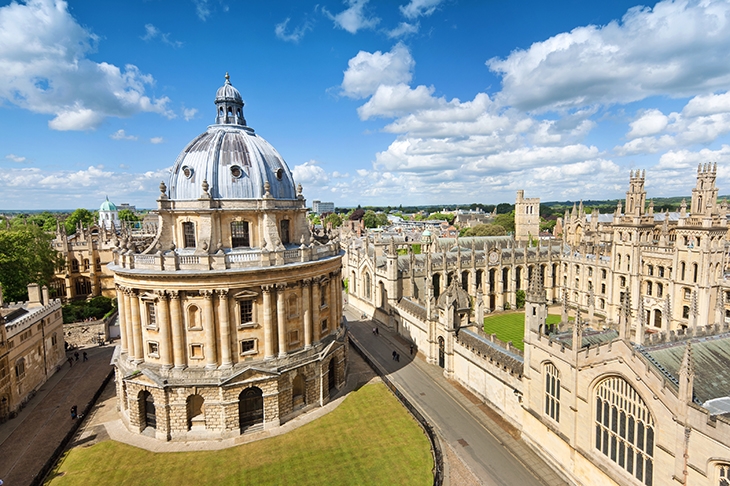Almost everyone agrees it is a pity that so few pupils from ‘disadvantaged socioeconomic backgrounds’ get into Oxford. But no one has successfully proved that it is Oxford’s fault that they do not. (I went to Cambridge, by the way, so I do not have a dog in this fight, except that I imagine the same arguments apply.) One reason that some universities, including Oxford, are classified as ‘world-class’ is that they admit the best. The definition of ‘best’ cannot refer only to native ability, but must also take some account of how well prepared a pupil is. To take an extreme example, it could be the case that an 18-year-old who can neither read nor write is a genius, but it is nevertheless not the university’s job to teach him or her the alphabet. Although the search for the best everywhere is a good thing, the constant assault on good universities over access is ill-intentioned because it tries to undermine their job — defining the best and choosing them. To exclude pupils because they have been to good schools is perverse, unjust and anti-educational. Oxford’s new idea of varying its A-level grade requirement for some applicants is not stupid, however. Perfect A* grades reveal little about the ability suitable for Oxbridge. It would be much better if Oxford and Cambridge reinstated the ‘seventh-term’ exam, which set pupils questions tailor-made for university requirements. Unlike A-levels, these tested originality and depth. Under the ‘seventh-term’ system, some pupils got in with very bad A-levels indeed, a few with none at all. But of course the universities got rid of all that more than 30 years ago, because they thought it was ‘elitist’.
You do wonder, though, what the new young entrants will learn when they get there. A friend draws my attention to TORCH, the magazine of the Oxford Research Centre in the Humanities. Its lead article this month, by Dr Amanda Power, associate professor in medieval history at Oxford, takes the view that Notre Dame cathedral should not be restored. This is because of the climate change emergency, she thinks. ‘Many people in the global south are staring the collapse of a functioning society in the face.’ Therefore it is wrong to spend more than a billion euros on ‘a western monument which helped create these conditions’. Notre Dame was a typical product of medieval Christian states, which attacked the religions of non-Europeans so they could justify ‘cutting down their sacred trees’ and invading them. So, she argues, leave Notre Dame in ruins: ‘Let it stand as a symbol of the damage that our climate denial and environmental entitlement have already caused our planet.’ On she goes about how the elite which built Notre Dame wore furs, causing beavers, wildcats ‘and most other fur-bearing animals bigger than a weasel’ to have a rough time. The same went for ‘sturgeon and some native salmon’, she adds. The only question I would ask of Dr Power is ‘Why stop at Notre Dame?’ Surely it’s time for TORCH to set fire to the medieval, western, environmental rapist otherwise known as Oxford University, and then give lectures about its iniquity among its smouldering ruins.
It would not normally be an act of great courage to vote Conservative in true-blue Sussex, but I feel I have to screw myself up to do so in the European elections this week, so great is the ill feeling here against the Tories for not achieving Brexit. Yet do it I will. In extenuation, I would plead that I do sincerely wish the Tories ill in these unusual elections. My vote is not intended to help them in any way. It is just that Daniel Hannan is first on the Conservative candidates’ list, and so there is a chance, if opinion polls are right, that he will be the only one of his party elected. It would be most unjust if he were kicked out. I want him to be the righteous remnant.
As I round off the last volume of my biography of Mrs Thatcher, I am at that stage of checking with interviewees and other sources when the author suddenly spots his omissions and mistakes. So it is consoling to know that even the immortals have these problems. A few years back, a kind person (I wish I could remember who) sent me a copy of a letter that James Boswell wrote to the poet and historian Thomas Warton in 1787. It starts, as such letters (and nowadays emails) usually do, with an apology: ‘I am certainly very much to blame for not having long ago acknowledged the favour of your obliging letter, with two to you from Dr Johnson.’ Then an admission: ‘The Life of our great Friend… is not yet so near its conclusion as you may suppose. Professional and social avocations have retarded my progress.’ Then a further demand for information: ‘You were so good as to say that you would give me some particulars which you recollected of Dr Johnson’s conversation with the King. Will you let me have them now…’ How well I recognise this pattern, including the reminder of how important are these last-minute efforts to capture the small stuff. Dr Johnson’s conversation with the King (George III) is one of the most amusing things in Boswell’s whole, great work.
My book raises a small matter of etiquette. Theresa May has a walk-on part in the final volume. It is my custom to include short biographical footnotes of most of those involved, with dates. The book will appear in early October. Should my footnote on Mrs May say that she was Prime Minister from 2016-2019 or ‘2016- ’? If the former, am I being discourteous by encompassing her political death? If the latter, might I be casting aspersions on her honour, since she has already promised that she will go very soon? Seeking guidance, I rang the Downing Street press office. That’s ‘a bit of a difficult one’, said the woman answering the phone. She advised me to add no end date. I think the 1922 Committee should know this.







Comments